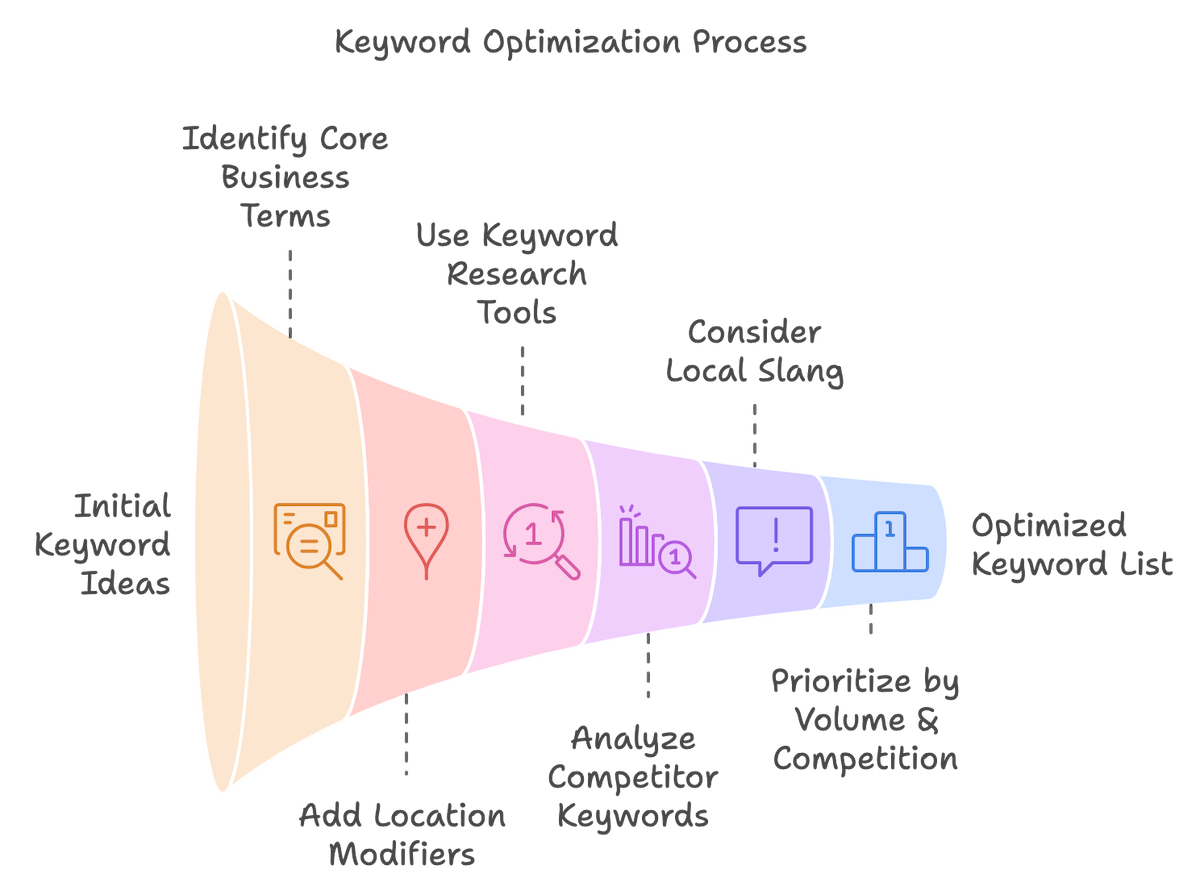Unlocking Local SEO: Mastering Keyword Research for Small Businesses ("How Local is Your Keyword Strategy?" Quiz Inside!)
By: Hayden Jarman

In a world where 46% of all Google searches have local intent, there's a massive opportunity for local businesses to get noticed, but only if they're doing keyword research right.
It's not enough to throw a few keywords onto your site and hope for the best.
You need a strategy—a focused, local keyword strategy that brings in customers from right around the corner.
So how do you make sure you're showing up in front of the people searching for businesses like yours? It starts with understanding keyword research for local businesses.
Let’s break it down into actionable steps that will help you rank higher, get more clicks, and turn local searchers into paying customers.
🌍 How Local is Your Keyword Strategy? 🔍
Take this quick quiz to see how well you've localized your SEO strategy!
Improve your local SEO today!
Table of Contents:
- Why Keyword Research Matters for Local Businesses
- Local Keyword Research: What Sets It Apart?
- Tools You Need to Nail Local Keyword Research
- The Step-by-Step Process for Local Keyword Research
- Optimizing Your Website for Local Keywords
- Boosting Local SEO with Emerging Trends
- Wrapping It Up: Your Path to Local Search Success
- Additional Resources
Why Keyword Research Matters for Local Businesses
You wouldn’t throw a dart in the dark and expect to hit the bullseye.
The same goes for attracting local customers online. Keyword research is your map, showing you exactly where to aim your content efforts to get results. With nearly 88% of people who search for a local business on their phone taking action within 24 hours, there's no room for guesswork.
You need to know what your potential customers are searching for—right down to the streets they’re walking on.
Key Stats That Show the Power of Local Searches:
- 46% of all Google searches are local in nature (HubSpot, 2024).
- 88% of mobile searches for local businesses result in a call or visit within 24 hours (Nectafy, 2024).
- "Near me" searches have grown by over 900% in the last two years (Google, 2024).
These numbers make one thing clear: if you want to dominate local search, you need to speak the language of your community. That’s where targeted keyword research comes in. For an overview of how SEO strategies continue to evolve, especially for 2024, check out this article on Google SEO updates.
Local Keyword Research: What Sets It Apart?
When you're doing local keyword research, you're targeting potential customers who are looking for services near them, right now.
It’s different from general keyword research because local searches have a sense of urgency.
The searchers aren’t just browsing—they’re ready to take action, whether it’s making a call, walking into a store, or booking an appointment.
Here’s how local keyword research differs from the broader game:
- Geographic Modifiers: Include city names, neighborhoods, or phrases like "near me."
- Search Intent: People are looking for businesses to fulfill an immediate need.
- Long-Tail Keywords: Use detailed, location-specific phrases that have less competition but higher purchase intent.
For more information on how to optimize your website content for rich results, which also ties in with keyword research, you can refer to this guide on SEO rich text.
Tools You Need to Nail Local Keyword Research
You don’t need a PhD in SEO to do effective keyword research, but you do need the right tools.
These platforms help you dig into what people are searching for locally and give you insight into how your competitors are ranking for those terms.
Must-Have Tools for Local Keyword Research:
- Google Keyword Planner – Start with Google’s own tool to identify keyword ideas and get location-specific search volumes.
- Ahrefs – A powerful platform that helps you see what keywords your competitors are ranking for.
- SEMrush – Use this to uncover keyword opportunities and track your position in local search results.
- Moz Local – Monitor your local rankings and get insights into how visible you are in searches.
- BrightLocal – Designed specifically for local businesses, BrightLocal helps you measure and improve local SEO performance.
- Google Trends – See what’s trending in your area and spot emerging keywords before your competitors do.
- Google Search Console – Track how your website is performing for local keyword searches.
For more in-depth competitor analysis tips, you can explore how to analyze competitors' sites for SEO.
The Step-by-Step Process for Local Keyword Research

Step 1: Identify Core Business Terms
Start by listing out the main terms that describe what your business does.
If you run a bakery, these could be "fresh bread," "birthday cakes," or "pastries." These core terms will serve as the foundation for your keyword strategy.
Step 2: Add Location Modifiers
Now, localize your keywords by adding geographic modifiers.
For example, instead of just "bakery," target "bakery in Brooklyn" or "best bakery near Williamsburg." Include common neighborhood names and popular landmarks to capture hyperlocal searches.
Example Keywords:
- "Affordable bakery in Brooklyn"
- "Wedding cakes near Williamsburg"
- "Best cupcakes near me"
Step 3: Use Keyword Research Tools
Leverage the tools mentioned earlier to find out what people are searching for in your area.
Look for keywords with a balance of good search volume and manageable competition.
Pro Tip: Use Google Trends to discover trending local searches. For instance, if there’s a food festival happening nearby, you might want to target terms related to the event.
Step 4: Analyze Competitor Keywords
What keywords are your competitors ranking for?
Tools like Ahrefs and SEMrush can show you which terms are driving traffic to their sites. This will help you identify gaps and opportunities in your own strategy.
Step 5: Consider Local Slang and Colloquialisms
In some areas, people use specific terms to describe local landmarks or neighborhoods.
A restaurant near Times Square might want to include both "Manhattan" and "Theatre District" in their keywords, as people may search for either.
Step 6: Prioritize Keywords by Search Volume and Competition
Not all keywords are created equal.
Focus on terms that have a healthy search volume but aren’t overly competitive. Long-tail keywords like "best gluten-free bakery in Brooklyn" may have lower search volume, but the people searching for them are highly likely to convert.
For additional insights on refining your keyword research strategy, you can read more about SEO strategy for 2024.
Optimizing Your Website for Local Keywords
Now that you’ve identified the right keywords, it’s time to put them to work across your site.
From title tags to Google Business Profile, every element of your online presence should be optimized to target these local searches.
Where to Use Local Keywords:
- Title Tags & Meta Descriptions: Make sure your most important local keywords appear in these places. For instance, "Best Coffee Shop in Brooklyn" is a powerful title tag that will attract local traffic.
- Headers & Content: Use your local keywords naturally in your on-page content. Avoid keyword stuffing—Google is too smart for that. Instead, weave the keywords into product descriptions, service pages, and blogs.
- Google Business Profile: If you haven’t claimed and optimized your Google Business Profile yet, do it now. Include your location-specific keywords in your business description and services.
- Local Citations & Directories: Ensure your business details (Name, Address, Phone—NAP) are consistent across all platforms, from Yelp to TripAdvisor. This consistency boosts your local SEO.
- Encourage Customer Reviews with Keywords: Ask your happy customers to leave reviews that mention your location and the specific services they used. Reviews like "Best plumber in Austin" will help you rank for those terms.
Need to know how many internal links per page is optimal for SEO? Check out this detailed guide.
Boosting Local SEO with Emerging Trends
Local keyword research is evolving, and businesses need to stay ahead of the curve.
Here are a few key trends shaping local SEO today:
1. Voice Search Optimization
More than 58% of consumers are using voice search to find local businesses. Voice search queries are typically longer and more conversational, so optimizing for phrases like "Where’s the nearest gas station?" is essential.
2. Hyperlocal Targeting
Customers aren’t just searching by city anymore—they’re searching by neighborhoods, streets, and even nearby landmarks. Make sure you’re targeting these hyperlocal keywords.
3. Video Content Optimization
Video content is an untapped opportunity for local SEO. Use location-specific keywords in your video titles, descriptions, and tags to improve your visibility on platforms like YouTube and Google.
4. AI-Powered Local Search
Google’s algorithms are getting smarter, using AI to deliver even more personalized local search results. This means local keyword research will become more granular, with a focus on user intent and behavior.
To optimize your content further, be sure to take a look at how to use image size optimization as part of your overall strategy.
Wrapping It Up: Your Path to Local Search Success
Keyword research is the foundation of your local SEO strategy.
Without it, you're flying blind. But with the right approach, tools, and optimization tactics, you’ll not only rank higher—you’ll attract more customers who are ready to buy.
By following the steps laid out in this guide, you’re setting yourself up for long-term success.
So don’t wait—start your local keyword research today, optimize your site, and watch your business grow.
To understand how a consistent strategy plays a critical role, check out this article on the importance of SEO consistency.
Additional Resources
If you're looking to dive deeper into local SEO and keyword research, check out these valuable resources:
-
4 Steps to Better Local Keyword Research - BrightLocal
Learn how to conduct effective local keyword research for your business. This guide covers the importance of keyword research for local SEO and provides a step-by-step process to identify and organize relevant local keywords. -
Local SEO: The Complete Guide - Ahrefs
A comprehensive guide to local SEO, covering everything from Google Business Profile optimization to local keyword research. Learn strategies to improve your business's visibility in local search results and attract more customers. -
Local SEO - Moz Blog
A collection of articles and resources focused on local SEO strategies, best practices, and industry insights from Moz experts. Stay up-to-date with the latest trends and techniques in local search optimization. -
Local SEO: The Definitive Guide to Improve Your Local Search Rankings - Search Engine Journal
An in-depth guide to local SEO, covering essential strategies, tools, and techniques to help businesses improve their local search rankings and attract more customers in their target areas. -
The Ultimate Guide to Local SEO - Neil Patel
Neil Patel's comprehensive guide to local SEO, offering actionable tips and strategies to help businesses improve their local search visibility, attract more customers, and outrank competitors in their area.
Need more personalized help with local SEO and keyword research?
Contact BlueTone Media today to learn how we can help your business dominate local search results and attract more customers. Reach out to us here for expert guidance and support.
Related Posts:
- Understanding Google’s Local Pack: How to Get Featured
- Google Business Profile FAQs: Everything You Need to Know
- The Best Google Ads Extensions to Boost Your Click-Through Rates
- How to Leverage Facebook Groups for Local Business Leads
- How to Use AI to Write Better Social Media Captions
- How to Optimize Google Reviews to Attract More Customers
- LinkedIn for B2B Marketing Success
- How to Conduct a Social Media Audit (w/ "Audit Readiness" Quiz!)
- Creating a Content Calendar for Consistent Posting
- The Importance of Mobile Optimization in 2024
- Data Privacy Regulations: What Marketers Need to Know
- The Role of Chatbots in Enhancing Customer Service
- SEO for Small Business: The Ultimate Guide to Getting Found Online
- The Role of Keyword Clustering in Modern SEO

